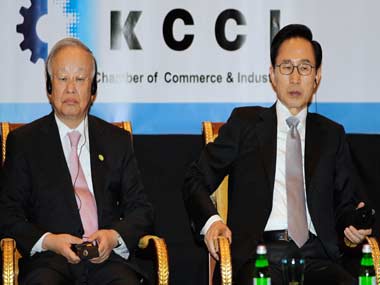Gimpo: South Korea’s main opposition party pledged to rein in the country’s huge business conglomerates, in some of its most explicit policy comments ahead of April parliamentary elections that opinion polls suggest it will win.
Lee Yong-sup, head of the left-of-centre party’s policy committee, told _Reuter_s in an interview that it also planned to boost spending on the poor with higher taxes on the rich.
[caption id=“attachment_226346” align=“alignleft” width=“380” caption=“The party also wants to unravel a “weak won policy” that has helped keep Korea’s export engine growing.”]  [/caption]
His Democratic United Party leads the governing conservative party by almost 38 percentage points to 33, according to the most recent opinion poll, and looks set to retake parliament and reverse five years of deregulation.
The top 30 “chaebol” or business conglomerates such as Samsung Group or Hyundai, had net profits that are equivalent to 40 percent of government spending in 2010, and their critics charge that they stifle competition in Asia’s fourth largest economy. “Chaebol must be reformed,” Lee said.
“We aim to achieve economic democratisation by which large and small companies, the rich and the poor can pursue co-prosperity,” he added.
Incumbent President Lee Myung-bak, whose mandatory single term will end after presidential polls in December this year, scrapped rules that limited the amount chaebol subsidiaries could invest in each other, something the DUP will reimpose, capping investments 40 percent of assets.
At the same time as limiting the role of the chaebol, the opposition also plans to reverse widening income gaps that have prompted growing social discontent and helped hand the governing party a string of electoral losses, inluding in the recent Seoul mayoral elections.
The party plans to increase tax on the top 1 percent of income-earners to fund its plan to boost spending on the poor by some 33 trillion won in each of the next five years.
“The tax hike on the 1 percent super-rich will give us money to raise welfare spending without raising tax on the 99 percent,” said Lee, 60, who served as a cabinet minister twice in the previous government that ruled until early 2008.
The party also wants to unravel a “weak won policy” that has helped keep Korea’s export engine growing at full throttle, but hit poorer people due to higher imported inflation.
“The Lee Myung-bak government has carried out intervention (to keep the won down) quite a lot, but that helped only the big exporters while hurting the small businesses and consumers,” Lee said.
Bank for International Settlements data shows the won has weakened by 40 percent against the yen over the past fours on an inflation-adjusted basis and by 17 percent against the Taiwanese dollar.
Both Japan and Taiwan are Korea’s main export competitors across a range of products.
Yet Lee says it is not all “anti-business” sentiment and that the party will not arbitrarily scrap a controversial free trade agreement with the United States, but would seek to renegotiate some aspects of it.
Reuters


)
)
)
)
)
)
)
)
)



